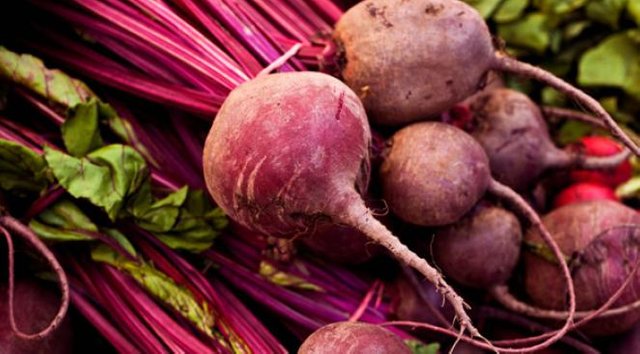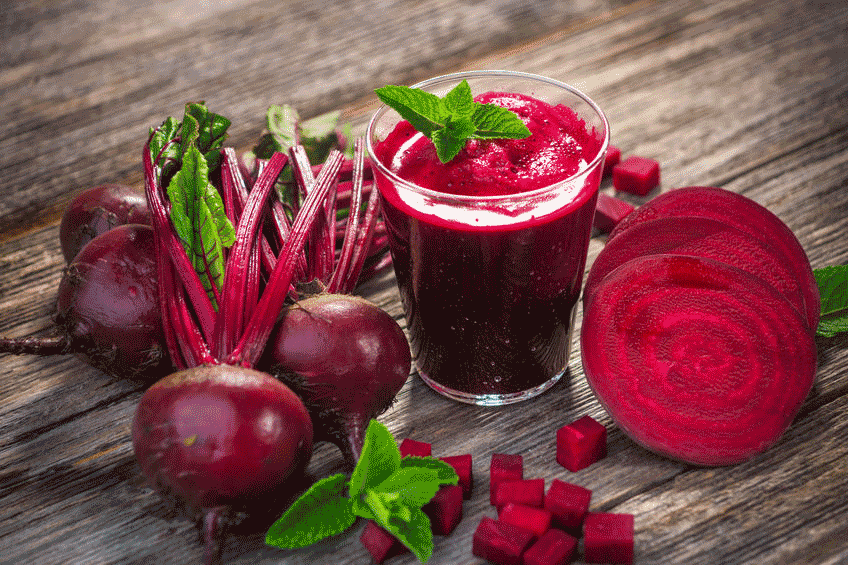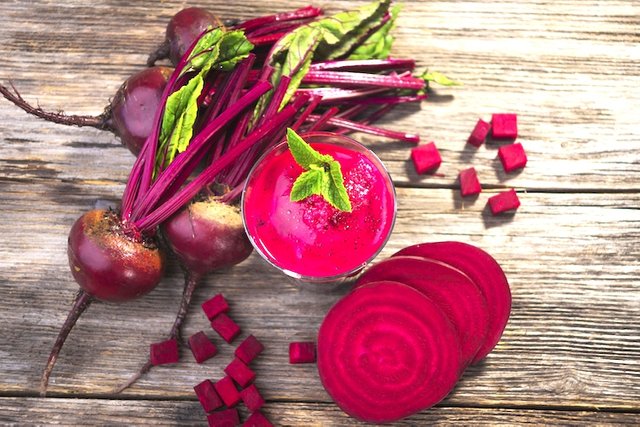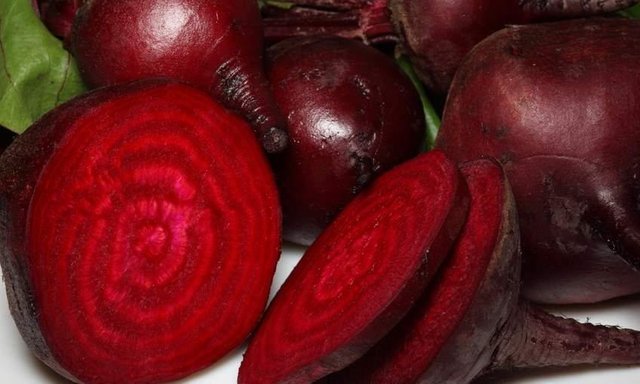
Beetroot is one of the favorite food items on the superfood scene, such as matcha, turmeric, cocoa, coconut or avocado.
Used for the production of sugar, as a vegetable in the diet, as fodder plants, or as a fuel (bioethanol), the beet is full of benefits and uses.
Consumed traditionally cooked or raw, it is part of the ingredients in recommended recipes for health, as in the "recipes gourmet real anti-cancer diet" of Professor David Khayat and the head Caroline Rostang.
According to a study published in February 2018 in the Journal of Cardiac Failure, beet juice supplements can help improve exercise capacity in patients with heart failure. Exercise capacity is a key factor in the quality of life and even the survival of these patients.
The study examined the impact of dietary nitrate in the form of beet juice supplements on the exercise capacity of eight patients with heart failure with a reduced ejection fraction - a condition in which the heart muscle does not does not contract effectively and can not blood to the body.

BETTERAVE JUICE SUPPLEMENTS AND CARDIAC INSUFFICIENCY
Tens of millions of people suffer from heart failure. In about half of these people, the ejection fraction of the heart is reduced. Heart failure is therefore the inability of the heart to perform its pump work. Because of their condition, these patients experience labored breathing, have reduced maximum oxygen uptake and consume more energy during exercise than would otherwise be the case.
Researchers found that the beet supplement dramatically increased exercise time, peak power, and maximum oxygen uptake during exercise. These improvements were not accompanied by changes in the patients' respiratory responses, and there was no change in their exercise efficiency.
Anomalies in aerobic exercise responses play a major role in disability, loss of independence, and reduced quality of life that accompany heart failure. Perhaps more importantly, increases in ventilatory demand and decreases in maximum oxygen uptake are highly predictive of mortality in patients with heart failure.
A second important aspect of the study is that there were no undesirable side effects of dietary nitrate. In this case, the absence of any significant change is good news, says the study.
The data suggest that dietary supplementation may be a valuable addition to the treatment of exercise intolerance in patients with heart failure with reduced ejection fraction. Multicentre trials are needed to confirm the proof of concept results and to determine whether long-term nutritional treatment of nitrates improves physical activity levels, quality of life and perhaps even survival in patients with heart failure. reduced ejection fraction.

DIETARY SUPPLEMENTS TO BEET FOR ATHLETIC EXERCISE AND PERFORMANCE
According to the latest official information such as the National Institutes of Health (NIH) Health Facts, beets are one of the richest sources of inorganic nitrate food. Ingested nitrate can improve exercise and athletic performance in many ways, primarily through its conversion to nitric oxide in the body.
Nitric acid is a powerful vasodilator that can increase blood flow and provide oxygen and nutrients to skeletal muscle. In this way, ingested nitrates can also improve performance by dilating blood vessels as oxygen levels decrease, increasing oxygen and nutrient supply, reducing the oxygen cost of submaximal exercise, mitigating the cost of the serum phosphate energy system, force production, and improve oxidative phosphorylation in mitochondria.

THE EFFECTIVENESS OF BEET
The effectiveness of beet (in the form of juice or juice concentrate and in the form of powder) varies according to the amount of nitrate, which is contained very disproportionately between the products.
Since 2007, there has been an increasing number of clinical trials on beet juice or concentrate as an ergogenic aid. Beet generally improved performance and endurance to different degrees compared to placebo in runners, swimmers, rowers and cyclists, and in burnout tests, but not in all studies.
The benefits of performance are more likely among recreational non-athletes than among high performance athletes. A study of 10 young active cyclists suggested a dose-response relationship. Although consumption of beet juice concentrated over 4 days to provide 4.2 mmol of nitrate (70 ml) did not bring any performance benefits over placebo, larger amounts of juice providing 8.4 mmol nitrate (140 ml) did.
However, beet juice consumption even richer in nitrate of 16.8 mmol (280 ml) did not bring additional performance benefits. There have been few studies on the effects of beet on anaerobic performance, such as high volume resistance exercise with many repetitions.

THE BENEFITS OF NITRATE SUPPLEMENTATION OF BETTERAVE JUICE
More research is needed to clarify the potential benefits of beet juice nitrate supplementation on exercise and athletic performance and to determine the best doses and dosing protocols. No research has evaluated longer-term supplementation with beet-derived nitrate beyond several weeks as an ergogenic aid.
Studies have not identified any safety concerns with the consumption of beet juice in moderate amounts - about 2 cups a day - for several weeks. The amount of nitrate that this amount of juice provides is less than half of the total nitrate consumption of a diet rich in vegetables and fruits.
Although not a safety issue, beet consumption may stain urine pink or red due to the excretion of red pigments in beets.

BENEFITS OF BEETFUL ACCORDING TO HEALTH EXPERTS
Finally, in a statement, the Academy of Nutrition and Dietetics (the Academy of Nutrition and Dietetics, is the largest association of nutritionists with more than 100,000 members), Dietitians of Canada (DoC) and the American College of Sports Medicine (ACSM) report that nitrate sources, such as beet juice, improve exercise tolerance and economy. Also, they improve endurance performance in recreational athletes.
The Australian Institute of Sport supports the use of beet juice to improve athletic performance in appropriate sports competitions under the direction of a sports medicine expert, but notes that more research may be needed to understand how the supplement should be used for better results.
To conclude, most studies used 500 ml per day (about 2 cups) of beet juice taken once (about 2.5 to 3 hours before exercise) or daily up to 15 days. This amount of juice provides about 5-11 mmol (or 310-682 mg) of nitrate, depending on the product. Potential benefits persist up to 24 hours after ingestion.
The labels on juice and beetroot concentrate generally indicate that these products are foods and not food supplements. Some food supplements contain beet powder in varying amounts, but studies have not evaluated whether these are viable alternatives to beet juice or beet juice concentrate.
SOURCES
"Dietary Nitrate Increases VO2peak and Performance But Does Not Alter Ventilation or Efficiency in Patients with Heart Failure with Reduced Ejection Fraction", February 2018, Volume 24, Issue 2, Pages 65-73, DOI: https://doi.org/10.1016 /j.cardfail.2017.09.004, http://www.onlinejcf.com/article/S1071-9164(17)31188-0/abstract
WARNING! folks out there, make sure its(Organic Beets) otherwise you get a high concentrated amount of pesticides in you :D
Downvoting a post can decrease pending rewards and make it less visible. Common reasons:
Submit